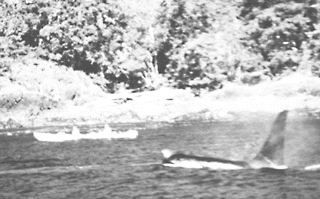https://www.austinchronicle.com/columns/1997-12-26/519308/
Day Trips
By Gerald E. McLeod, December 26, 1997, Columns
|
|
Whale watching from a kayak along the coast of Canada's Vancouver Island can be described in one word -- awesome.
I was in the backseat of a two-person kayak in strait between the mainland and northern Vancouver Island chasing a pod of six or seven orca whales when the dorsal fins disappeared under the choppy surface. A couple of minutes later the crew of another kayak yelled and pointed to the fins that had emerged in the other direction. My kayaking partner, Carolyn Galvin, and I turned the 22-foot yellow boat toward the pod and started paddling with an adrenalin-powered enthusiasm that made our tired arms forget the previous four hours of paddling.
We hadn't gone far before a bigger charter whale-watching boat pulled in front of us. We stopped paddling to let the boat pass. Suddenly, with a swoosh and a splash a baby orca raised his head and much of his body out of the water within a paddle's length of our boat and then disappeared under the bow. The suddenness of the appearance startled Carolyn and I so much that if we hadn't been strapped into the kayak by a rubber spray skirt, I think that we both would have jumped out of our seats.
After four days of chasing the elusive beasts around the islands off the coast, we had finally caught up with a pod.
"What do you think of whale-watching now?" I asked Carolyn.
"Awesome," she replied with the thrill still evident in her voice, "Just awesome."
As we passed the cruise ship, a woman yelled out, "You guys have the best seats in the house." Indeed we did.
Whale watching and tourism have become the third major industry along the western Canadian coast, replacing fishing and just behind logging and mining as a means to make a living. Remarkable, considering that as recently as 1961, the government mounted a machine gun on Vancouver Island to be used on killer whales. Although the gun was never used, it does illustrates the attitude of the time.
The largest member of the dolphin family, there has never been a documented unprovoked attack by an orca on a human in the wild. It was not until the early Seventies that fulltime research on the whales began. Researchers have discovered that orcas travel in close-knit family groups centered around a female and her offspring. The whales use a complicated dialect that is unique to each community. Individual whales are identified by the distinctive markings on their dorsal fins.
While movies and theme parks have helped spark interest in the creatures, they have also added to misunderstandings. The first orca for an aquarium was captured off western Canada in 1964. The practice continued unabated until 1977, when public outcry forced the industry to go to Iceland and Russia.
British Columbia has the largest and most accessible population of orcas in the world. In 1979, a paved road to the north end of the island turned the region's villages into tourist destinations instead of logging and fishing camps.
While I was in British Columbia last summer, I tried the four-hour whale-watching trip and a six-day kayaking tour. Both have their advantages, but the sea kayaking tour is a trip of a lifetime. Even if I had not had a baby orca jump out of the water next to my boat, the trip would have been awesome.
As in most any outdoor adventure, sea kayaking is often a test of your personal strength and fortitude against nature. While our guide emphasized safety, there were times when struggling against a strong current, high waves, or steady winds that the adrenaline that is created only by fear would involuntarily surge through my body.
Every day on the six-day trip was exciting. We ate enough to gain weight and played hard enough to drop into our sleeping bags from exhaustion every night. Of all the wonderful things we experienced during the week, nothing can compare to the personal satisfaction of having stretched one's limits.
I traveled with Rivers & Oceans, a subcontractor for Outdoor Adventure River Specialist (OARS). Founded in 1969, OARS offers adventure tours to some of the most beautiful wilderness areas in western North America.
The trips range from river trips spending every night in a lodge in California to helicoptering to exploring the remote mountains of British Columbia. The whales are most active off the Canadian coast mid-July to mid-September, just when Texans are looking for a break from the heat.
For more information, call 800/346-6277 for a catalog that will have you planning your summer vacation early. Or visit their website at http://www.oars.com.
From ski vacations to golf get-aways, British Columbia is a spectacular destination. For more information on whale tours and other recreation opportunities, call 800/667-3306.
Coming up this weekend...
Los Pastores at Mission San Jose in San Antonio is an old Spanish pastorela depicting the battle between good and evil as Lucifer attempts to prevent the shepherds from going to Bethlehem, Dec. 27, 7pm. 210/224-6163.
Cowboy Christmas Ball starring Don Walser at the Luckenbach Dance Hall, Dec. 27, 9pm. 830/997-3224 or http://www.luckenbachtexas.com.
Coming up...
Picasso: Photography and Painting exhibits rarely seen photographic works by Picasso and continues at the Houston Museum of Fine Arts thru Feb. 1. 713/639-7300.
Copyright © 2024 Austin Chronicle Corporation. All rights reserved.

